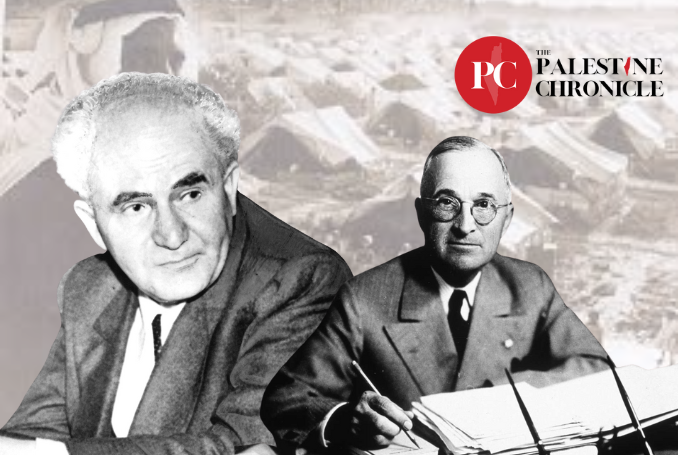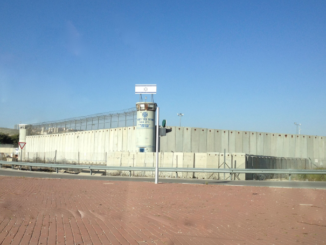
Israel’s Zionist founders did not come in peace. They fashioned a country based on force and intimidation. With each decade, their progeny have intensified the violence.
The future is uncertain for a country birthed in violence and that lives an ethos of violence.
The Middle East has known more than its share of tragedy and grief since May 14, 1948. On that date, Israel proclaimed itself a state in Palestine and within minutes, US President Harry S. Truman recognized its provisional government as the de facto authority of the new Jewish state in the heart of the Islamic world.
The hegemonic goals of the United States and Israel have converged since the end of the Second World War. Both have regarded the domination of Muslims and their governments as central to their imperial and regional interests.
The world order they envisioned, however, did not correspond with the national interests of the natives of Palestine and their determination to resist dispossession and the occupation of their land by European Zionists.
Peaceful coexistence had no place in the envisioned Eretz Israel colonial project. And peace has not been America’s legacy in the region since it emerged as a post-war imperial power.
Although Israel’s leaders have publicly professed a desire for peace, they have continually obstructed constructive deliberations and initiatives, and have instead initiated expansionist wars, illegally occupied the land of others and contributed to the militarization of the region.
For seven decades, US-sponsored peace plans, accords and negotiations have provided cover for Israel as it has executed its settler-colonial project. Even today, as the leading medical journal, (July 2024), reported a death toll in Gaza that could exceed 186,000 or more, Washington continues to affirm its “ironclad” support for Israel’s killing fields in Gaza. American financial, diplomatic and military support have encouraged Israel to become the brutish villain it is today.
After the October Gazan prison break, Israel has used the weapon it has always relied on—violence—to destroy the desire of Palestinians for freedom from Zionist oppression. It has unleashed its genocidal violence on a people and a strip of land, with a 4,000-year history, once ruled by various dynasties and empires.
Palestinian leaders, too, have not escaped Israeli violence. Tel Aviv has a history of assassinating the leadership of the resistance. The latest casualty was Ismail Haniyeh, Chairman of Hamas’s Political Bureau, assassinated in Tehran on the last day of July.
Five months earlier, Marwan Issa, deputy commander of the military wing of Hamas, was assassinated in Gaza. Before them, Hamas’s co-founders, Abdul Aziz al-Rantisi and Sheikh Ahmed Yassin (confined to a wheelchair most of his life) were killed in Gaza in 2004.
Israeli violence has not been limited to Palestine. Since October 2023, the Israeli military has killed at least nine leaders and military commanders in Lebanon, Syria and Iran.
On July 30, 2024, Israel struck a residential area in southern Beirut, killing senior Hezbollah commander, Fouad Shukr. And on the same day, the United States carried out an attack on a base south of Baghdad operated by Iraq’s Popular Mobilization Forces, leaving four dead and many injured.
The People’s Democratic Republic of Yemen, with a long history of support for Palestine, has also felt the wrath of the United States. In early November 2023, in response to Israel’s bombardment and siege of Gaza, Ansarallah (Houthis) began a concerted campaign to disrupt Red Sea shipping. Since then, the United States has launched airstrikes across Ansarallah-controlled areas of Yemen.
According to Saudi Arabia’s Al Arabiya, the airstrikes (20 July) on a fuel depot and oil refineries at the Red Sea port of Hodeidah—Yemen’s economic lifeline—were carried out in a joint operation by Israel, the United States and Britain. The attack on the country’s vital port sparked a huge blaze, killing six and wounding 87 Yemenis.
Given Washington’s complicity with Israel’s genocide, it was obvious that intervention by another world power was needed. Palestinians welcomed The People’s Republic of China’s invitation to broker reconciliation talks. After three days in Beijing, 14 Palestinian groups signed a unity agreement on July 23, 2024.
The agreement, calling for the formation of an interim national reconciliation unity government to take charge of post-war Gaza and the West Bank, was rebuffed by the Biden administration. Instead they reiterated their desire to see the Palestinian Authority—rejected by the vast majority of Palestinians—with the governing role in Gaza.
Also, predictably was the White House’s disregard for the landmark ruling by the International Court of Justice on July 19, 2024 that laid out a comprehensive plan for peace, justice and security for all in Palestine-Israel.
As history reveals, Israel has maintained its residency in the Middle East through violence. In addition, US-Israeli domination has relied on conflict and regional division to sustain that dominance.
As Washington deepened its involvement in the region, it viewed attempts at unification as threats to US-Israel interests and supremacy—not unlike its perception of political Islam today.
America’s determination to control events was asserted in the Eisenhower Doctrine of 1957, which called for an expanded role for the US military in the region. The doctrine reflected hostility toward and desire to contain the growing influence of pan-Arab nationalism, as well as fear over the presence of the then-Soviet Union.
By 1957, pan-Arabism— an ideology that advocated for Arab cultural, political and socioeconomic unity—had become the dominant ideology in the Arab world and Egyptian President Gamal Abdel Nasser (1956-1970) its undisputed leader.
Under Nasser’s leadership, Egypt and Syria joined together in 1958 to form the United Arab Republic, a union which lasted until 1961. The focus of the Arab Nationalist Movement was on unity, avenging the loss of Palestine and on opposition to colonialism and Western imperialism.
Arab nationalism, already weakened, was severely undermined by the humiliating defeat of Egypt and Syria by Israel’s preemptive war in 1967, which ultimately led to Nasser’s decline and erosion of the movement. It is important to note that the United States supplied armaments to Israel during the war.
Arab unity has never recovered; instead, countries like Egypt and Jordan have become US welfare states and oil-rich Arab dictators have become regional clients of Washington and Tel Aviv. And the United States has come to see the region solely through the prism of preserving Israel at all costs.
The resolve of Palestinians, as they battle against US-Israeli domination, represents the hoped-for nationalism that appealed to and once stirred large segments of the Arab world.
The political class in the United States has been indifferent to the aspirations of 500 million Muslims in the Middle East, but has instead devoted its resources, prestige and support to one state with a population of some 7.5 million non-Muslim Israelis.
Israel’s Zionist founders did not come in peace. They fashioned a country based on force and intimidation. With each decade, their progeny have intensified the violence. Emboldened, they no longer disguise their long-sought-after mission to ethnically cleanse Palestine. And the tragedy for America, is that it has chosen to be a partner in that mission.
The US and Israel have tried mightily to make Palestinians futureless, but they have always underestimated their strength and the 4,000-year history that has planted them firmly in Palestine.

– Dr. M. Reza Behnam is a political scientist specializing in the history, politics and governments of the Middle East. He contributed this article to The Palestine Chronicle.








Yes, Israel was created, and exists, not just through violence but actually through terrorism by Zionists. However, what is seldom highlighted, if ever, is the fact that those Zionists were, and still are, CAUCASIAN Jews whose ‘claim’ to Palestinian land was not based on their ethnicity or race but on an archaic interpretation of their own particular religion, a religion that is far less prolific or widespread than, for example, Muslim, Christian or Buddhist religions. It is, however, a religion that has, regrettably, achieved economic and political influence far beyond any other and therein lies the problem!